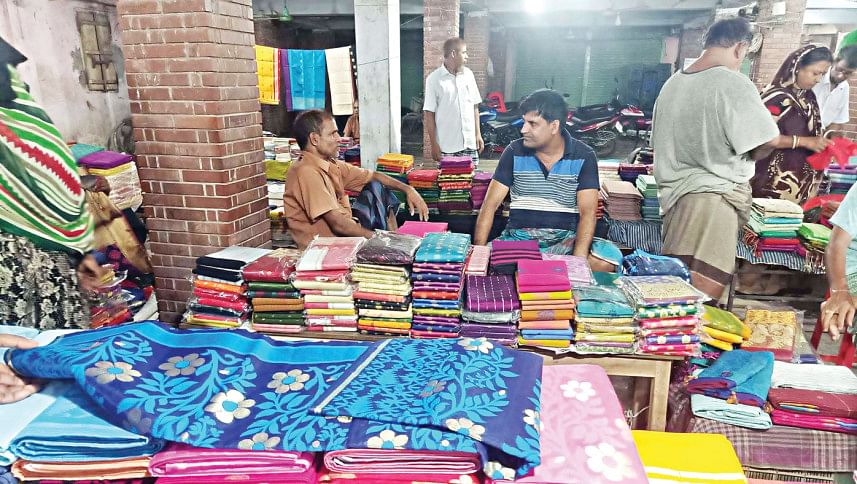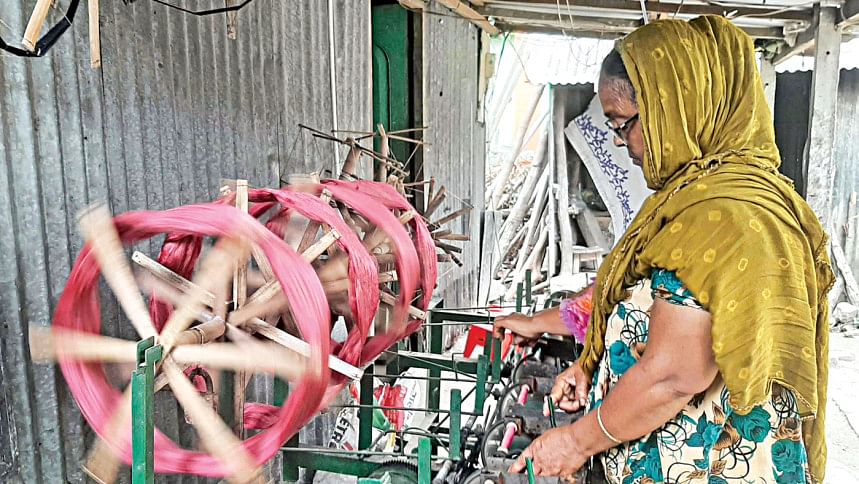Poor Eid sales frustrate Tangail sari traders

Tangail sari weavers and traders are disappointed ahead of Eid-ul-Azha this year as the people's decreasing purchasing power coupled with the ongoing flood situation in different parts of the country has led to poor sales, according to market players.
Weavers and traders said they could not sell an adequate number of saris even during Eid-ul-Fitr, when demand for the product is traditionally high compared to the current festival season.
This only compounded their woes following a two-year standoff with Covid-19, which had brought business to a grinding halt.
Tangail saris are produced all over Tangail district but production is particularly high in the Pathrail area of Delduar upazila, which is known as the capital of Tangail sari.
"Here, weavers produce different qualities and variations of saris using cotton, jute, silk and more," said Jogendra Basak, a weaver living in Pathrail.
Certain local weavers are adept at making changes to their designs to keep up with current trends and they can produce both casual and formal saris with prices ranging from Tk 500 to Tk 20,000.

And thanks to this flexibility in design and materials used, Tangail saris are usually a hot item in local markets ahead of any major cultural event, such as the two Eids, Puja and Pahela Baishakh.
"But sales are not satisfactory this year. Instead, business has fallen a lot since the coronavirus pandemic," said Abdur Razzak, who sells the saris through his shop called Tangail Kutir in Pathrail.
"I think people do not have sufficient money to buy saris at the moment as they spent a lot of their savings during and after the pandemic period," he added.
Razzak went on to say the abnormal spike in prices of all essential goods also cut the people's purchasing power.
Swapan Basak, a sari trader in Delduar upazila, said weavers had made various designs for the last several months in anticipation of higher sales on the occasion of Pahela Baishakh and Eid-ul-Fitr.
However, almost no sales were registered during Pahela Baishakh while receipts were also poor in the festival market centring Eid-ul-Fitr.
Now, traders have been frustrated by the low turnout of wholesalers ahead of Eid-ul-Azha.
As such, the saris are being sold almost exclusively at different local markets, including the hundred-year-old weekly Karatia and Bajitpur markets in Tangail sadar upazila.
In the past, wholesalers also came from India to buy Tangail saris, market sources said.
"But the number of wholesalers is not satisfactory this year," said Saiful Islam, a sari trader based in Karatia market.
Shahjahan Ansary, an organiser of the Karatia market, said the market would witness annual sales of around Tk 200 crore during the pre-pandemic era.
Sumi Akter, a resident of Bakshiganj in Jamalpur district who came to buy saris from Karatia market a couple of days ago, said prices of the product have increased this year.
"I sell the saris online with a low profit margin but as the prices of all types of Tangail saris ranging between Tk 1,000 and Tk 2,000 have increased by 20 per cent, my business has become untenable," she added.
Local weavers and traders said increasing input costs, such as yarn and wages, forced them to slightly increase prices this year.
They also mentioned that they had to increase their workers' wages due to a shortage of skilled labour in the profession as many handloom factories were permanently closed during the pandemic period.
As per data from the Tangail office of the Bangladesh Handloom Board, about three lakh weavers were employed by about two lakh handloom factories in different upazilas of Tangail a few decades ago.
At present, there are more than 25,000 manual handlooms and 3,000 power looms in the district but around half of the one lakh people currently working in the district came from neighboring regions, such as Sirajganj and Pabna.

 For all latest news, follow The Daily Star's Google News channel.
For all latest news, follow The Daily Star's Google News channel. 



Comments